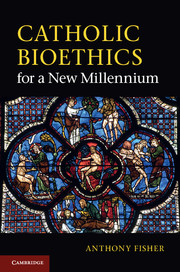Book contents
- Frontmatter
- Contents
- Foreword
- Abbreviations
- Introduction
- PART I How are we to do bioethics?
- Chapter 1 Context: challenges and resources of a new millennium
- Chapter 2 Conscience: the crisis of authority
- Chapter 3 Cooperation: should we ever collaborate with wrongdoing?
- PART II Beginning of life
- PART III Later life
- PART IV Protecting life
- Index
- References
Chapter 3 - Cooperation: should we ever collaborate with wrongdoing?
from PART I - How are we to do bioethics?
Published online by Cambridge University Press: 05 June 2012
- Frontmatter
- Contents
- Foreword
- Abbreviations
- Introduction
- PART I How are we to do bioethics?
- Chapter 1 Context: challenges and resources of a new millennium
- Chapter 2 Conscience: the crisis of authority
- Chapter 3 Cooperation: should we ever collaborate with wrongdoing?
- PART II Beginning of life
- PART III Later life
- PART IV Protecting life
- Index
- References
Summary
The complicity of intellectuals
In Complicities: The Intellectual and Apartheid Mark Sanders examines the role of thinkers during the apartheid era. He begins with the South African Truth and Reconciliation Commission, which attributed culpability not only to specific persons but also to groups including churches, healthcare organizations and the wider community. It challenged South Africans to recognize ‘the little perpetrator’ in each of them and to accept their responsibility both for the evil that happened and for ensuring it is never repeated. Nonetheless, Sanders says, ‘until recently, there has been no full-scale philosophical exposition of complicity on which to draw’. He turns therefore to Émile Zola, Karl Jaspers and Jacques Derrida for an explanation of how even those who do not formally support a particular evil can live symbiotically with it and have some responsibility for it. Some acquaintance with how sin (original, personal and structural) and cooperation in evil have been treated by Christian theology might have enriched Sanders’ book. Even so, his work challenges intellectuals – pastors, ethicists, hospital chaplains, healthcare leaders – regarding their complicity with evils, including evils that the Church very publicly opposes.
In a world ablaze with headlines about cloning, over-the-counter abortifacients, resource shortages in hospitals, withdrawal of feeding from the unconscious and any number of other problems, the subject of cooperation in evil might appear obscure, even self-indulgent. Yet it is precisely in this area that so many moral dilemmas arise for people. As Henry Davis remarked half a century ago, there is no more difficult question in moral theology. Perhaps this explains why so little has been written on it compared with the headline issues.
- Type
- Chapter
- Information
- Catholic Bioethics for a New Millennium , pp. 69 - 98Publisher: Cambridge University PressPrint publication year: 2011



